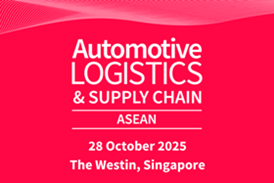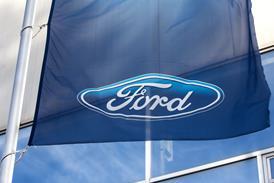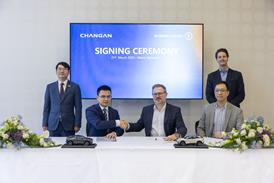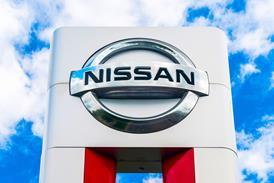All Ports and processors articles – Page 19
-
 News
NewsToyota begins assembly from SKD imports in Ghana
Toyota is assembling the Hilux pickup truck at its new $7m plant in the African republic of Ghana. The trucks are being assembled from imported SKD kits and the same method will be used for Suzuki Swift production from next year
-
 News
NewsPhilaport benefits from grant for berth development at Southport terminal
The US port of Philadelphia is to benefit from a $49m grant that will help development of a new $130m multi-use berth at the Southport ro-ro terminal, which handles vehicle imports
-
 Feature
FeatureNow is the time to invest in sustainable port infrastructure
Ports are the gateway to supply chain recovery and growth for the North American automotive industry, and officials from the US Maritime Administration, Kuehne + Nagel and the American Association of Port Authorities see opportunity to strong returns on investment in capacity, transport links and digitalisation.
-
 Feature
FeatureProtecting vehicle delivery quality, sustainably
Prevention is better than the cure when it comes to vehicle damage and insurance. Experts from ABI Tape, Trinity Rail and Horizon Auto Logistics discuss key strategies and data to maintain quality across North American vehicle logistics.
-
 Feature
FeatureDelivering electric vehicles in America: charging ahead with a heavy load
EV sales are on the rise in the US, and with that new logistics considerations for vehicle weight, charging infrastructure and services. Experts from Lucid, Glovis and the American Trucking Association discuss how best to prepare.
-
 Feature
FeatureCan North American vehicle logistics ports get past Industry 3.0?
There are growing capacity demands on ports but many OEMs, processors and logistics carriers depend on manual processes. Volkswagen’s Michael D’Angelo doesn’t think it needs to be that way.
-
 Feature
FeatureCross the plains and rugged mountains
Canadian Pacific has been increasing its investment in compound and track infrastructure to support growing automotive business despite the disruption caused by the coronavirus and looks set to continue its reach across the US and Canada
-
 Feature
FeatureMaking the best of it at Mazatlán
Terminal Marítima Mazatlán (TMAZ) runs the finished vehicle terminal at the Mexican port of Mazatlán and over the last decade the company has invested $20m in infrastructure and technology to increase volumes. While Covid has hit throughput Nissan remains committed and TMAZ is gearing up for a return in trade
-
 News
NewsVW puts carbon-neutral exports top of agenda for EV deliveries to the US
Volkswagan has moved more than 8,000 units of its ID.4 electric SUV to the US from Germany since March this year and has set out to make the method of delivery as sustainable as the vehicle it is delivering, all part of its ‘goTOzero impact logistics’ strategy
-
 News
NewsVehicle electrification shakes up export and import flows
There are regional differences in the sales and manufacture of electric vehicles that are affecting finished vehicle logistics flows, with some countries with relatively small automotive output becoming the bigger EV exporters. That has consequences for finished vehicle logistics, as a new report from Ultima Media’s business intelligence unit, Automotive, makes clear
-
 News
NewsMatt Ritter now leading vehicle planning and logistics at Subaru of America
Matt Ritter (pictured) has replaced Troy Poston as vice-president of vehicle planning and logistics at Subaru of America. He will direct vehicle sales operations, including shipping, tracking and delivery to retailers, as well as all port operations, and inland and parts logistics.
-
 News
NewsCanadian Pacific invests in rail connections to port of Saint John
Canadian Pacific Railway is moving vehicles out of the Canadian east coast port of Saint John again for the first time in 25 years and investing C$90m in track infrastructure over three years to add capacity and services for automotive in Canada
-
 News
NewsVehicle terminal opens at US port of Mobile
The port of Mobile in the US state of Alabama has a new $60m finished vehicle ro-ro terminal including a 3,700 sq.m vehicle processing centre (VPC) and storage capacity for 7,000 vehicles.
-
 News
NewsHaropa completes merger of Le Havre, Rouen and Paris ports
This month the French ports of Le Havre, Rouen and Paris officially merged under the banner of Haropa Port and the joint venture is planning to extend vehicle storage capacity at Le Havre from the current 56,000 vehicles to 80,000 by 2027 by reorganising the current storage, and taking 43 additional hectares around the existing terminal.
-
 News
NewsMOL uses AI to more efficiently allocate car carriers
Mitsui OSK Lines (MOL) is using a new artificial intelligence (AI) tool to plan the allocation of car carrier vessels across its global network.
-
 News
NewsABP turns to Inform for digital vehicle management at Southampton
Logistics software specialist Inform is providing an integrated and scalable cloud management system for Associated British Ports’ (ABP) vehicle terminal operations.
-
 News
NewsBLG expands Kelheim capacity for Kia
BLG Logistics has commissioned the building of a third multistorey car park at its inland auto terminal in Kelheim, Germany for Kia Motors Deutschland.
-
 News
NewsReturning vehicle sales test Russian ro-ro capacity
Returning vehicle sales in Russia are prompting ocean transport providers to return laid up vessels into operation as capacity on international routes becomes tighter. Higher tariffs on containerised vehicle shipments from China is also leading to a switch in mode to ocean, adding to the demand for more services. That is expected to create an imbalance in supply and demand in the ro-ro transport sector in the short and medium-term.
-
 Feature
FeatureBuilding a future for vehicle trade after Covid
Last year was one of unprecedented challenge for the UK’s vehicle handling ports but, as Marcus Williams reports, they maintained operations, invested in infrastructure and are taking lessons forward for future trade
-
 Feature
FeatureWatch: A permanent change in container shipping for automotive
Capacity, lead time and cost issues in container shipping have disrupted automotive shippers, and long-term structural changes in the sector will lead to new supplier relationships, according to Drewry.






























